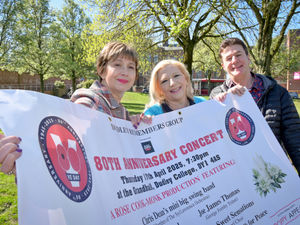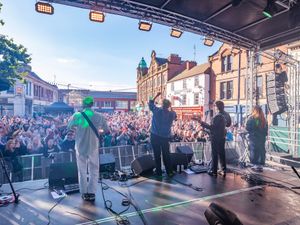How Marc Bolan's death rocked my world
Tony Stringfellow had only been married for a couple of weeks, and had just dropped his new wife off at work.

As he drove along the busy main road home, the news came on his car radio which forced him to pull over to the side of the road in a state of shock – his hero Marc Bolan, the father of glam rock, had been killed in a car crash.
That was 40 years ago tomorrow, and Tony remembers how just a few years before the flamboyant T Rex frontman had given the teenager a love of poetry which would make him a well-known figure on the Shropshire arts scene.
"When I heard the news on the radio, I couldn't believe it," says Tony, whose works have become a regular feature of the Wellington Literary Festival.
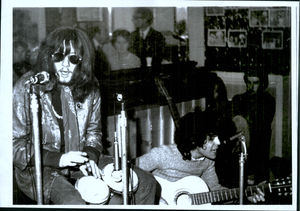
"I know me, I'm as soft as a brush and I probably cried, he was such an icon to me.
"I had seen him live twice. You don't think these people could ever die."
Bolan, who along with his close friend David Bowie had set the tone of the 1970s pop scene with his heavy guitar sounds and equally weighty make-up, was killed early in the morning of September 16, 1977, when a purple Mini being driven by his American girlfriend Gloria Jones.
Despite owning several cars, Bolan had never learned to drive, fearing it would be the cause of his premature death.
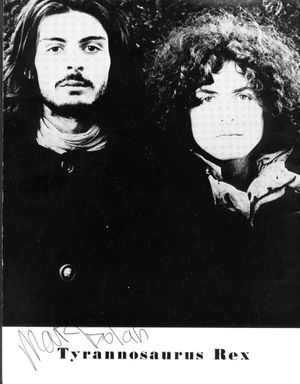
The night before the crash, Bolan's management company had lent his white Rolls-Royce to the rock band Hawkwind, so Bolan, Gloria and her brother Richard went to a party in the Mini. At the party, they got chatting to former nightclub singer Vicky Aram, and Bolan invited Vicky back to his home in East Sheen, London to discuss musical projects. As she and Richard followed Bolan and Gloria back from Mortons drinking club in Berkeley Square, Vicky watched in horror as she crossed a hump-back railway bridge in Barnes, south-west London.
"As I came over the bridge with Richard beside me, I can still in my mind see, so clearly, a purple car which looked like a little beetle," she recalled in an interview five years ago.
"It was upright and it was smoking and there was a tiny glimmer of light from the moon, the night was so still."
It is thought that Gloria had lost control of the car as she negotiated the bridge, striking a fence post before hitting a sycamore tree. Neither Gloria nor Bolan were wearing a seat belt.
Bolan was killed instantly, while Gloria suffered a broken arm and broken jaw and spent time in hospital. She did not learn of Bolan's death until the day of his funeral.
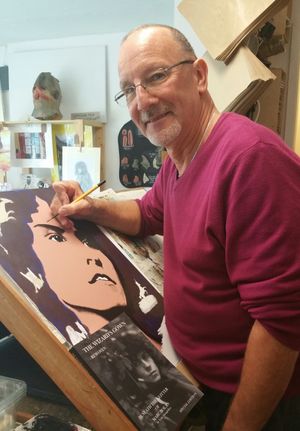
In the immediate aftermath of his death, Bolan's house was looted by souvenir hunters, and many parts were also stolen from the car itself.
Tony remembers seeing T Rex perform live on two occasions, first on May 19, 1971 at Wolverhampton Civic Hall, and then at the Odeon in Birmingham on June 9, 1972.
"There was nothing else like him at that time," he says.
"When you think back to the early 70s, you had Val Doonican in the charts, the Beatles were still in the charts around that time.
"And then you had this guy with glitter on his face, androgynously dressed, it was the start of glam rock, he created that whole thing."
Tony, who grew up in Wolverhampton before later moving to Shifnal, was so captivated with Bolan and his story, that he wrote a book called The Wizard's Gown chronicling his remarkable life story.
Bolan was born Mark Feld in 1947, to a working-class family in Hackney, east London. His mother Phyllis was Christian, but his father Simeon was a Jew with Russian and Polish ancestry, and Mark was named after his uncle Private Mark Feld, who had been beaten to death by an anti-Semitic fellow soldier the previous year.
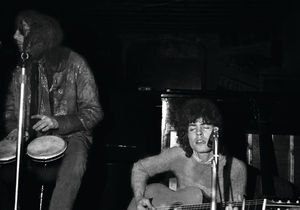
At the age of nine he formed his own skiffle band, and while at school with Helen Shapiro he played the guitar in her trio "Susie and the Hula Hoops". A school friend remembered him turning him up at school in tears the day Buddy Holly died, only to be told by a teacher that Holly would be forgotten within a decade.
After leaving school, he worked briefly as a model, posing in suits for the menswear chain John Temple, and he also appealed as an extra in the television series Orlando, where he was dressed as a mod. But music remained his first great love, and after handful of failed solo singles, and a brief spell as the lead guitarist of psychedelic rock band John's Children, he formed Tyrannosaurus Rex in July 1967.
The band did not enjoy the happiest of starts. Bolan – his adopted stage name was reputedly a contraction of that of his hero, Bob Dylan – booked the Electric Garden at London's Covent Garden on July 22, 1967, before he had finalised line-up. Legend has it that he was still holding auditions on the day of the show, and by all reports the band's debut performance was a disaster. Originally a four-piece electric band made up of Bolan, drummer Steve Porter who would take the name Steve Peregrin Took, guitarist Ben Cartland and an unknown bass player, the bandmates barely knew one another and had little chance to practice. The performance was panned by pretty much everybody who witnessed it, and it was little surprise that it would never perform again in that format. Undeterred, Bolan reinvented Tyrannosaurus Rex as a two-piece acoustic band featuring just himself and Took. Bolan's eccentric lyrics and eastern-influenced melodies, coupled with Took's use of unusual percussion instruments, earned the band a loyal following on London's emerging hippie scene, and in its early days it was championed by Radio 1 DJ and former Shrewsbury schoolboy John Peel.

By 1969, a rift had developed between Bolan and Took. While Bolan was now living a quiet life with girlfriend June Child, and had just written his book of poetry, Took had fully embraced himself in the anti-establishment, drug-taking UK Underground scene in Ladbroke Grove, north London. The pair parted company, and Took's place was taken by new percussionist Mickey Fynn, and the new-look band began to move towards electric rather than acoustic instruments. In 1970, the band shortened its name to T Rex – reputedly after manager Tony Visconti became bored with writing the name out in full and began abbreviating it.
The snappy new title was used for the band's break-out single Ride A White Swan, as Bolan embraced a more pop-orientated, light-hearted style. Out went the introspective folk style music, which was going out of fashion anyway, and in came catchy electric tunes and flamboyant outfits, which included top hats, glitter, and stars stuck on his face. It is said that he got the idea for the glitter after seeing his then wife June wearing it.
As the glam-rock era dawned, Bolan and T Rex entered the musical stratosphere, selling 40 million records by the time of his death in 1977. But behind the screaming fans, all was not well for the singer, who descended into a drug and alcohol addiction, as well as the break-up of his marriage.
"I got involved with drugs, particularly cocaine, and I started to drink a lot. I just didn’t particularly want to be a rock star any more," he said.
"I was living in a twilight world of drugs, booze and kinky sex. Before I crashed out of the pop scene I was drinking myself to death."
Ironically, by the time of his death, Bolan had begun to get his life on track.
"He had stopped the drinking and the drugs, and had begun going for runs to get himself into shape and look after his body," says Tony Stringfellow, who now keeps an art studio in Barmouth called The Paper Swan in tribute to his hero.
Tony, who is painting a picture of Bolan to mark the anniversary, says while people remember T Rex for hit pop singles such as Get It On, I Love To Boogie, and Hot Love, he says it is the albums, with their insightful, fantasy-based lyrics that really show the genius of Bolan.
"A lot of people criticised Bolan for writing nonsensical lyrics, but many of these were written allegorically," he says.
"Instead of writing about a director who did the dirty on him, for example, he would say it was a wizard doing the dirty. The singles were written for the pop market, but the albums were a lot deeper."
*The Wizard's Gown by Tony Stringfellow is available on Amazon.




